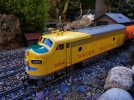duncan1_9_8_4
Garden Railway Operator
Morning. I purchased, off ebay an F7. It works absolutely perfectly on my Dads Massoth Digital set up. But on my set up, CS3 with the Mobile App, occasionally, when bringing the loco to a stand, the leading motor/bogie keeps running while the rear is idle, meaning that the leading motor is trying to drag the back one. It doesn't happen all the time. What could be causing this, any ideas?

